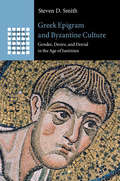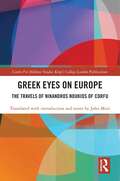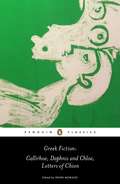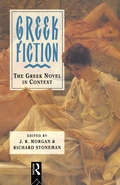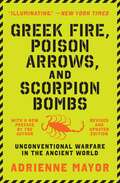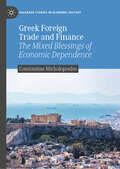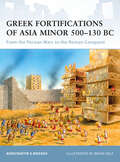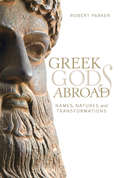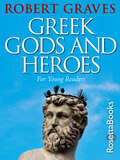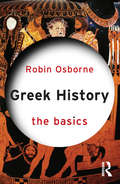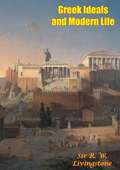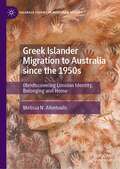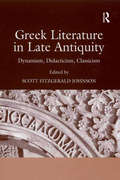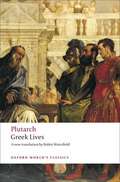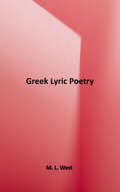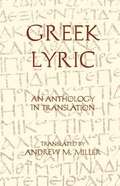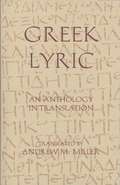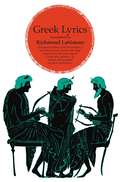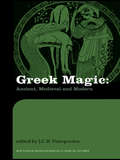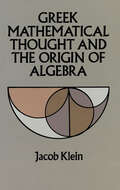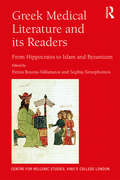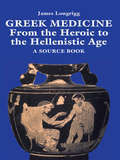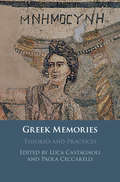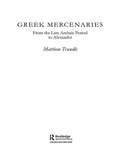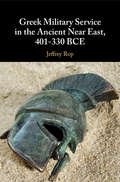- Table View
- List View
Greek Epigram and Byzantine Culture: Gender, Desire, and Denial in the Age of Justinian (Greek Culture in the Roman World)
by Steven D. SmithSexy, scintillating, and sometimes scandalous, Greek epigrams from the age of the Emperor Justinian commemorate the survival of the sensual in a world transformed by Christianity. Around 567 CE, the poet and historian Agathias of Myrina published his Cycle, an anthology of epigrams by contemporary poets who wrote about what mattered to elite men in sixth-century Constantinople: harlots and dancing girls, chariot races in the hippodrome, and the luxuries of the Roman bath. But amid this banquet of worldly delights, ascetic Christianity - pervasive in early Byzantine thought - made sensual pleasure both more complicated and more compelling. In this book, Steven D. Smith explores how this miniature classical genre gave expression to lurid fantasies of domination and submission, constraint and release, and the relationship between masculine and feminine. The volume will appeal to literary scholars and historians interested in Greek poetry, Late Antiquity, Byzantine studies, early Christianity, gender, and sexuality.
Greek Eyes on Europe: The Travels of Nikandros Noukios of Corfu (Publications of the Centre for Hellenic Studies, King's College London #22)
by John MuirThis is the first complete English translation of a lively travelogue written by Andronikos aka Nikandros Noukios, a Greek from Corfu, who accompanied a diplomatic mission from Venice to England in the middle of the sixteenth century. He describes some of the great northern Italian cities, gives vivid impressions of picturesque Germany, of sober but enthusiastic Lutheran church services, and of cities on the Rhine. In the Low Countries he visits the commercial centres and in England gives a real sense of the excitement of London and its sights. He rather liked the English (even giving a recipe for beer), and is clearly fascinated by Henry VIII, his attacks on the monasteries and his break with Rome. He then surprisingly joins up with a troop of Greek mercenaries, but finally leaves them and returns to Italy through France with glimpses of Fontainebleau and Francis I. We leave Andronikos after he has visited Rome on his way back to Venice. The book is an almost unknown source for the sixteenth century and will certainly be of interest to historians and students. It is also an important and little-known landmark in the development of Modern Greek literature, especially relevant to the burgeoning modern interest in travel writing. It is accessible and a good read.
Greek Fiction: Callirhoe, Daphnis and Chloe, Letters of Chion
by Chariton LongusIn this collection of Greek fiction written between the first and fourth centuries AD, 'Callirhoe' is the stirring tale of star-crossed lovers Chaereas and Callirhoe, torn apart when she is kidnapped and sold as a slave, while 'Daphnis and Chloe' tells of a boy and girl abandoned at birth, who grow up to fall in love and battle pirates. Greek Fiction - also containing 'Letters of Chion', an early thriller about tyranny and a political assassination - is a fascinating glimpse into an alternative view of Ancient Greece's literary culture.
Greek Fiction: The Greek Novel In Context
by Richard Stoneman J. R. MorganFirst published in 1994. Routledge is an imprint of Taylor & Francis, an informa company.
Greek Fire, Poison Arrows, and Scorpion Bombs: Unconventional Warfare in the Ancient World
by Adrienne MayorA gripping and groundbreaking history of how ancient cultures developed and used biological, chemical, and other unconventional weapons of warFlamethrowers, poison gases, incendiary bombs, the large-scale spreading of disease: are these terrifying agents of warfare modern inventions? Not by a long shot. In this riveting history of the origins of unconventional war, Adrienne Mayor shows that cultures around the world have used biological and chemical weapons for thousands of years—and debated the morality of doing so. Drawing extraordinary connections between the mythical worlds of Hercules and the Trojan War, the accounts of Herodotus and Thucydides, and modern methods of war and terrorism, this richly illustrated history catapults readers into the dark and fascinating realm of ancient war and mythic treachery.
Greek Foreign Trade and Finance: The Mixed Blessings of Economic Dependence (Palgrave Studies in Economic History)
by Constantine MichalopoulosThis book examines the role of international trade and finance in the Greek economy since the beginnings of the Greek state two centuries ago to the present day. It focuses on the benefits and challenges of Greece&’s economic dependence on the larger and higher income countries of Western Europe, and in particular the European Union, have played in its economic development. The volume begins by examining Greece&’s links to Europe in the 19th century and its desultory participation in the Latin Monetary Union. Its main focus is the post- World War II period, starting with Greece&’s efforts to establish sustainable economic growth, at a time when the country was facing severe foreign exchange constraints and relied on assistance from the US under the Marshall Plan. It then examines relations between Greece and the European Community, particularly on its efforts to integrate into the European Union, the debt crisis and the reforms and recovery in its aftermath. The book details in accessible and engaging style how the story of Greece&’s economic integration in Europe has involved both successful development but also failures by Greek, Eurozone and IMF policymakers. With valuable historical insights, this book will be of interest to academics and policymakers in Greece, the EU and emerging economies weighing economic integration. It will also be of interest to economic historians and political economists more broadly.
Greek Fortifications of Asia Minor 500-130 BC
by Brian Delf Konstantin NossovSandwiched between the heart of ancient Greece and the lands of Persia, the Greek cities of Western Anatolia were the spark that ignited some of the most iconic conflicts of the ancient world. Fought over repeatedly in the 5th century BC, their conquest by the Persians provided a casus belli for Alexander the Great to cross the Hellespont in 334 BC and launch the battle of Granicus and the sieges of Miletus and Halicarnassus. A blend of Greek and Asian styles of military architecture, these fortified cities were revolutionary in their multi-linear construction - successive defensive walls - with loopholes and mural arches. Konstantin Nossov illustrates the evolution of Greek fortifications and the influences of the region they bordered in this fascinating study.
Greek Gods Abroad: Names, Natures, and Transformations
by Robert ParkerFrom even before the time of Alexander the Great, the Greek gods spread throughout the Mediterranean, carried by settlers and largely adopted by the indigenous populations. By the third century b.c., gods bearing Greek names were worshipped everywhere from Spain to Afghanistan, with the resulting religious systems a variable blend of Greek and indigenous elements. Greek Gods Abroad examines the interaction between Greek religion and the cultures of the eastern Mediterranean with which it came into contact. Robert Parker shows how Greek conventions for naming gods were extended and adapted and provides bold new insights into religious and psychological values across the Mediterranean. The result is a rich portrait of ancient polytheism as it was practiced over 600 years of history.
Greek Gods and Heroes: For Young Readers
by Robert GravesAn accessible anthology of the greatest ancient Greek myths and legends for readers of all ages by the celebrated classicist and historical novelist. According to the myths, gods and goddesses of ancient Greece lived on Mount Olympus and ruled the world of mortals. Famous heroes shaped the course of history, beautiful women drew the gazes of gods and men alike, and the gods were both fickle in their favors and breathtakingly generous to those they smiled upon. From Midas&’s tragic gift to the exploits of Hercules and the curse of Pandora, Robert Graves brings the legends of ancient Greece to life in a way that&’s sure to appeal to everyone; from children to adults, and from casual readers to serious scholars. &“Directly told, with no attempt to oversimplify them, a good deal of the symbolism and the association with the pattern of ancient Greece survives.&” —Kirkus Reviews (starred review).
Greek History: The Basics (The Basics)
by Robin OsborneGreek History: The Basics is a concise and compelling introduction to the study of Ancient Greece from the end of the Bronze Age to rule by Rome. With a chapter on each crucial period of Greece’s ancient history, the book covers the key topics, approaches and issues at the heart of Greek History, including: • The invention of politics and the rise of democracy • The central role played by the Greek city • The insights from cultural, political, demographic and economic history • The benefits and pitfalls of working with different types of sources. Featuring maps, illustrations, a timeline and annotated guides to further reading, this book is an engaging and authoritative introduction for students of Ancient Greek History.
Greek Ideals and Modern Life (Martin Classical Lectures #5)
by Sir R. W. LivingstoneThis book represents a collection of lectures delivered between October 1-4, 1934 by the author, Sir Richard Winn Livingstone, on the Charles Martin Foundation at Oberlin College, Ohio. The book was first published a year later in 1935. Sir Livingstone was then President of Corpus Christi College at the University of Oxford."The title of these lectures is Greek Ideals and Modern Life. They are a plea for Greek studies--not as a field of scholarship, not as a mental discipline, not even as the key to one of the two greatest literatures of Europe, but as indispensable to the spiritual life of our civilization. They are based on three assumptions: first, that Huxley was right in his belief that 'no human being, and no society composed of human beings, ever did, or ever will, come to much, unless their conduct was governed and guided by the love of some ethical ideal'; second, that the chief weakness of this age is a vague mind and a feeble grasp, so far as ethical ideals are concerned; and third, that Greece offers us a corrective of our errors and a guide in our uncertainties."
Greek Islander Migration to Australia since the 1950s: (Re)discovering Limnian Identity, Belonging and Home (Palgrave Studies in Migration History)
by Melissa N. AfentoulisIlluminating the experiences of immigrants to Australia in the late twentieth century, this book uses oral history to explore how identity and belonging are shaped through migration. Between the 1950s and the 1970s, many inhabitants from the small Greek island of Limnos travelled to Australia to flee post-war devastation and economic disaster. With an emphasis on the lived experiences and memories of Limnians, the book sheds light on the emotional pain and trauma they felt as they were separated from their families and homeland. Moving away from more traditional outlooks on migration studies, this book emphasises the significance of ethno-regional identity, and analyses how it can bring strength and longevity to a constructed community. Both the roles of men and women within the Greek diaspora are examined, in the way that they made the difficult decision to leave their homeland, and subsequently how they came to nurture and build families within a new, evolving community. Looking beyond first-generation migration, the author analyses the pattern of return visits to Limnos by the descendants of migrants. Acting as a form of identity consolidation for second-generation migrants, this journey to the ancestral homeland highlights the fluidity of what it means to belong somewhere, and redefines the notion of ‘home’. The author provides an alternative perspective to traditional migration studies and reaffirms the importance of transnational identity. A unique and important addition to research, this book combines memory studies and oral narrative to analyse how identity and belonging can be shaped across borders, rather than within them.
Greek Literature in Late Antiquity: Dynamism, Didacticism, Classicism
by Scott Fitzgerald JohnsonLate Antiquity has attracted a significant amount of attention in recent years. As a historical period it has thus far been defined by the transformation of Roman institutions, the emergence of distinct religious cultures (Jewish, Christian, Islamic), and the transmission of ancient knowledge to medieval and early modern Europe. Despite all this, the study of late antique literary culture is still in its infancy, especially for the Greek and other eastern texts examined in this volume. The contributions here presented make new inroads into a rich literature notable above all for its flexibility and unparalleled creativity in combining multiple languages and literary traditions. The authors and texts discussed include Philostratus, Eusebius of Caesarea, Nonnos of Panopolis, the important St Polyeuktos epigram, and numerous others. The volume makes use of a variety of interdisciplinary approaches in an attempt to provoke discussion on change (Dynamism), literary education (Didacticism), and reception studies (Classicism). The result is a study which highlights the erudition and literary sophistication characteristic of the period and brings questions of contextualization, linguistic association, and artistic imagination to bear on little-known or undervalued texts, without neglecting important evidence from material culture and social practices. With contributions by both established scholars and young innovators in the field of late antique studies, there is no work of comparable authority or scope currently available. This volume will stimulate further interest in a range of untapped texts from Late Antiquity.
Greek Lives: A Selection of Nine Greek Lives
by Robin WaterfieldHere, Plutarch introduces the major figures and periods of classical Greece, detailing the lives of nine personages, including Lycurgus, Solon, Themistocles, Cimon, Alexander, Pericles, Nicias, Alcibiades, and Agesilaus. Oxford presents a comprehensive selection, translated and accompanied by a lucid introduction, explanatory notes, bibliographies, and indexes.
Greek Lyric Poetry (Oxford World's Classics Ser.)
by M. L. WestThe Greek lyric, elegiac, and iambic poets of the two centuries from 650 to 450 BC - Archilochus and Alcman, Sappho and Mimnermus, Anacreon, Simonides, and the rest - produced some of the finest poetry of antiquity, perfect in form, spontaneous in expression, reflecting all the joys and anxieties of their personal lives and of the societies in which they lived. This new poetic translation by a leading expert captures the nuances of meaning and the whole spirit of this poetry as never before. It is not merely a selection but covers all the surviving poems and intelligible fragments, apart from the works of Pindar and Bacchylides, and includes a number of pieces not previously translated. The Introduction gives a brief account of the poets, and explanatory Notes on the texts will be found at the end.
Greek Lyric: An Anthology in Translation
by Andrew M. MillerFrom the preface: "This anthology of translations is drawn from the little that remains of the lyric poetry produced in the Greek world during the seventh, sixth, and fifth centuries B.C. Following ample precedent, it includes not only monody and choral lyric but also short poems and frag-ments in the elegiac and iambic meters, even though the latter do not fit the etymological definition of lyric as "poetry composed to be sung to the lyre."
Greek Lyric: An Anthology in Translation
by Andrew M. MillerSuccessfully integrating elegance and a close fidelity to the Greek, these new translations aim to provide Greekless students with as close a sense as possible of how the Greeks themselves thought and wrote about the world. Miller's skillful introduction places the works in historical context and briefly describes the different metrical forms represented in the selections. Headnotes to each section highlight the background of the poet whose works follows. Complete with a glossary of names and a select bibliography.
Greek Lyrics: More than a Hundred Poems and Poetic Fragments from the Great Age of Greek Lyric Poetry
by Richmond LattimoreA collection of more than one hundred poems and poetic fragments from the golden age of Greek Lyric poetry. In this second edition of Greek Lyrics, translator and editor Richmond Lattimore brings together a vast assortment of seventh-and sixth-century Greek lyric, elegiac, and iambic poetry. For the Greekless student or curious scholar, these translations showcase the diversity of poetic subjects in classical antiquity, which range from love poems to medical inscriptions and drinking songs. Gracefully and robustly translated by a number of top-tier translators, this volume includes poets such as Archílochus, Callínus, Semónides of Amórgos, Hippónax, Tyrtaéus, Mimnérmus, Solon, Phocýlides, Xenóphanes, Theógnis, Terpánder, Alcman, Stesíchorus, íbycus, Sappho, Alcaéus, Anácreon, Hýbrias, Praxílla, Corínna, Simónides of Ceos, Pindar, and Bacchýlides.
Greek Magic: Ancient, Medieval and Modern (Routledge Monographs in Classical Studies)
by J.C.B. PetropoulosMagic has always been a widespread phenomenon in Greek Society, starting from Homer’s Circe (the first ‘evil witch’ in western history) and extending to the pervasive belief in the ‘evil eye’ in the twenty-first century Greece. Indeed, magic is probably the most ancient and durable among social and religious phenomena known to classical and other scholars, and it can be traced over a span of some three millennia in sources in the Greek language as well as in an impressive range of visual and other media. For instance, curse tablets from fourth-century B.C. Athens, the medico-magical gems of late antiquity, early Christian amulets, and various exorcism prayers from the medieval and later periods. Organised chronologically, the intriguing panorama offered by this book guides the reader through the ancient, medieval, modern and even contemporary periods, highlighting the traditions, ideologies and methods of magic in each period of Greek history. It brings together the latest insights from a range of experts from various disciplines: classicists, art historians, archaeologists, legal historians and social anthropologists amongst others.
Greek Mathematical Thought and the Origin of Algebra
by Jacob KleinImportant study focuses on the revival and assimilation of ancient Greek mathematics in the 13th-16th centuries, via Arabic science, and the 16th-century development of symbolic algebra. This brought about the crucial change in the concept of number that made possible modern science -- in which the symbolic "form" of a mathematical statement is completely inseparable from its "content" of physical meaning. Includes a translation of Vieta's Introduction to the Analytical Art. 1968 edition. Bibliography.
Greek Medical Literature and its Readers: From Hippocrates to Islam and Byzantium (Publications of the Centre for Hellenic Studies, King's College London #20)
by Petros Bouras-Vallianatos Sophia XenophontosThis volume focuses on the relationship between Greek medical texts and their audience(s), offering insights into how not only the backgrounds and skills of medical authors but also the contemporary environment affected issues of readership, methodology and mode of exposition. One of the volume’s overarching aims is to add to our understanding of the role of the reader in the contextualisation of Greek medical literature in the light of interesting case-studies from various – often radically different – periods and cultures, including the Classical (such as the Hippocratic corpus) and Roman Imperial period (for instance Galen), and the Islamic and Byzantine world. Promoting, as it does, more in-depth research into the intricacies of Greek medical writings and their diverse revival and transformation from the fifth century BC down to the fourteenth century AD, this volume will be of interest to classicists, medical historians and anyone concerned with the reception of the Greek medical tradition. Chapters 3, 6, and 9 of this book are freely available as downloadable Open Access PDFs at http://www.taylorfrancis.com under a Creative Commons Attribution-Non Commercial-No Derivatives (CC-BY-NC-ND) 4.0 license.
Greek Medicine: From the Heroic to the Hellenistic Age A Source Book
by James LongriggFirst Published in 1998. Routledge is an imprint of Taylor & Francis, an informa company.
Greek Memories: Theories and Practices
by Luca Castagnoli Paola CeccarelliGreek Memories aims to identify and examine the central concepts underlying the theories and practices of memory in the Greek world, from the archaic period to Late Antiquity, across all the main literary genres, and to trace some fundamental changes in these theories and practices. It explores the interaction and development of different 'disciplinary' approaches to memory in Ancient Greece, which will enable a fuller and deeper understanding of the whole phenomenon, and of its specific manifestations. This collection of papers contributes to enriching the current scholarly discussion by refocusing it on the question of how various theories and practices of memory, recollection, and forgetting play themselves out in specific texts and authors from Ancient Greece, within a wide chronological span (from the Homeric poems to Plotinus), and across a broad range of genres and disciplines (epic and lyric poetry, tragedy, comedy, historiography, philosophy and scientific prose treatises).
Greek Mercenaries: From the Late Archaic Period to Alexander
by Matthew TrundleThis book provides a detailed picture of the life of these Greek mercenaries, analyzing who they were and from what section of society they came. It explores their motivations, their relationships and connections, both with each other and those with whom they served, and shows how mercenaries were recruited, paid and maintained. Matthew Trundle reviews a variety of evidence, including Xenophon's detailed account of how over ten thousand Greeks tried and failed to establish the Persian prince Cyrus on his brother's Imperial throne, the fragments of a fourth century play about the first ever soldier of fortune, and inscriptions prohibiting Athenians from taking service with their neighbours. The result is a fresh look at the significance of mercenaries in ancient Greek society, economy and politics, and their part in the process that shaped the great Empire of Alexander the Great and the Hellenistic world.
Greek Military Service in the Ancient Near East, 401–330 BCE
by Jeffrey RopThis is the first monograph dedicated to the history of Greek military service for the Achaemenid Persian Empire and the Kingdom of Egypt from the rebellion of Cyrus the Younger to the conquests of Alexander the Great. Through careful analysis of the political contexts of their recruitment and detailed reconstructions of their performances as soldiers and generals on the battlefield, Jeffrey Rop overturns the traditional view that the Greeks who fought in the Near East were mercenaries hired for their superior military skills as heavily armored hoplites. The presence of unprecedented numbers of Greek infantry in the armies of Persia and Egypt is not evidence that the levies of these states were militarily inferior or deficient, but a clear sign of unprecedented foreign political influence among the most powerful leaders and cities of Greece for much of the fourth century.
